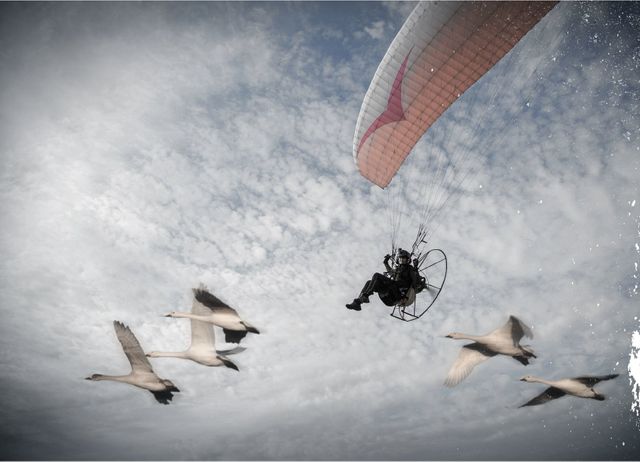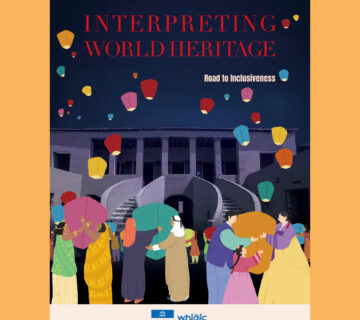How good interpretation and engaging with local communities can inspire a cross-border inter-governmental conservation movement.
Running along the ground, the wind catches under the wing and her feet leave the ground. She’s airborne. She climbs quickly and now she’s soaring over the huge expanse of the Arctic tundra with only the rush of the wind and the sound of swans and geese honking. From up here, she can see more of this remote area; such a perfect breeding ground for birds, safe from predators. The only human presence, the local tribes herding reindeer in traditional ways.
Following watercourses and coastlines, she begins her 7,000km journey south, through more densely populated areas and 11 European countries to reach the UK, experiencing and recording everything that all migratory birds have to contend with on their route: habitat loss and dwindling or changing water supplies; pollution; power lines; being shot at by hunters.
Just outside a town, a huge congregation of school children shouts up and waves. She comes down on a strip of grass and is immediately enveloped in cheering and TV cameras trying to capture the moment. The Human Swan has landed, making one of many pre-arranged visits in her three-month journey along the migratory flyway where she will engage with local communities and government officials to inform and discuss the plight that migratory birds are facing and encourage cross-border cooperation for conservation.
The Flight of the Swans project took place in 2016 with the human swan, Sacha Dench, flying by paramotor in often perilous conditions along the migration route of Bewick’s swans. Polar bears, personal injury and huge logistical challenges, as well as everything that the real swans have to deal with, including the weather, did not stop the human swan. By using powerful storytelling, along with the ambitious adventure to capture media attention, the project gained huge support.
It was awarded the 2017 Campaign of the Year in the ENDS Environmental Impact Awards for engaging more than 10,000 people on the ground, including school children, local indigenous communities, hunting groups, fish farmers, artists and government officials. More than 1,700 stories featured in the media, most of those on TV and radio, including prime-time chat shows with celebrities, and almost every story talked about the threats to swans because it was impossible to cover a woman attempting this flying feat without also asking the question, ‘Why?’.
More than 30 partner organisations got involved and were invited to interpret the story their own way to tackle their priority issues. The adaptation of the overall story to local culture and the activities inspired by it ranged hugely. In Poland, Sacha landed live on national breakfast TV to talk about lead poisoning (the only country en route with no restriction on lead in hunting) which led to a mass public response in letters and phone calls to the media and shooting associations, and hunters joining a Swan Symposium. In Latvia, an art competition encouraging people to interpret the swan stories received such a response from all ages that entries could only be cut down to a shortlist of 100. Each piece interpreted the Bewick’s swan story differently and entries ranged from swans of sculptured lace to recycled plastics and the entire migration of the swans knitted into mittens.
And now, looking to 2021 when the UN COP26 meeting on climate change will take place in Glasgow, UK, the human swan is planning to take to the skies again. This time, two record-breaking activities will come together to raise awareness of the need to act against climate change. Flying around Britain’s coastline by green-powered electric paramotor, Sacha will visit as many climate activists and local grassroots projects as possible to highlight the best of the positive action already happening. While doing this, she will attempt to inspire the largest number of people ever to sign up to a climate pledge in support of positive action in their own lives – not just around the UK but around the world through media and online coverage. Finally, the climax of this exciting project will be to deliver the results directly to the world leaders at the COP next year and demand more action. She has already been offered a seat at the table with direct access to amplify all our voices and concerns on the climate crisis.
This story comes with a price tag! The project is possible only with public support: the Crowdfunder (link below with more information on the project) is live until 23 December. It’s been a difficult year for everyone, but climate change is already affecting us all. If you are able to support the initiative in any way, please consider adding to the funds to enable Sacha to take our voice on climate action to the UN. And please share the link far and wide and consider how you could become a part of the journey. Thank you.
I’m sure the human swan will have even more tales to tell us from her latest adventure.
https://www.crowdfunder.co.uk/round-britain-climate-challenge
Marie Banks is IE’s News Coordinator. When not volunteering for IE, she runs her own interpretation and proofreading business, www.zebraproof.uk. She can be contacted at: marie.banks@interpret-europe.net.
Sacha Dench is the UN Ambassador for Migratory Species and set up the NGO Conservation Without Borders www.conservationwithoutborders.org.
You can see some of the highlights of the Flight of the Swans project here: https://flightoftheswans.org/expedition/highlights/.
To cite this article:
Banks, Marie (2020) ‘Stories in the sky’. In Interpret Europe Newsletter 4-2020, 33-34.
Available online: https://www.interpret-europe.net/fileadmin/Documents/publications/Newsletters/IE_newsletter_2020_4_winter.pdf




